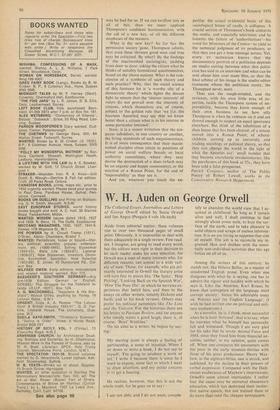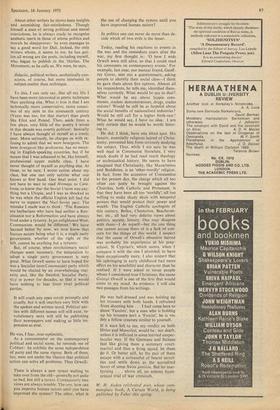W. H. Auden on George Orwell
The Collected Essays, Journalism and Letters of George Orwell edited by Sonia Orwell and Ian Angus (Penguin 4 vols lOs each) Aside from editorial matter, these volumes run to over two thousand pages of small print. Obviously, it is impossible to deal with them adequately in a single review. Few read- ers, I imagine, are going to read every word, but the editors were right in their decision to let each reader make his own selection, for Orwell was a man of many interests who, for different reasons, can appeal to a wide vari- ety of men. Those, for example, who are pri- marily interested in Orwell the literary artist will turn first to pieces like 'The Spike', 'Hop Picking', 'Looking Back on the Spanish War', 'How The Poor Die', in which he narrates ex- periences that befell him, and then to the essays on other writers, notably Dickens and Swift, and to his book reviews. Others may prefer his political pamphlets like The Lion and the Unicorn:For the historian there are his letters to Partisan Review, and for anyone who simply wants a good laugh, there is, of course, 'Boys' Weeklies.'
On his aims as a writer, he begins by say- ing: My starting point is always a feeling of partisanship, a sense of injustice. When I sit down to write a book, l do not say to myself, 'I'm going to produce a work of art.' I write it because there is some lie I want to expose, some fact to which I want to draw attention, and my initial concern is to get a hearing.
He realises, however, that this is not, the whole truth, for he goes on to say:
I am not able, and I do not want, comple-
tely to abandon the world view that I ac- quired in childhood. So long as I remain alive and well, I shall continue to feel strongly about prose style, to love the sur- face of the earth, and to take pleasure in solid objects and scraps of useless informa- tion. It is no use trying to suppress that side of myself. The job is to reconcile my in- grained likes and dislikes with the essen- tially non-individual activities that this age forces on all of us.
Among the writers of this century, he stands out, like Hilaire Belloc, as a master of unadorned English prose. Even when one disagrees with what he is saying, one has to admire the vigour and lucidity with which he says it. Like the Austrian, Karl Kraus, he knew that corruption of the language must corrupt society: hence his admirable essay on 'Politics and the English Language', (I wish he had written one on political and mili- tary euphemisms.) As a novelist, he is. I think, most successful when he is least 'fictional', that is to say, when he narrates what he himself has personally felt and witnessed. Though 1 am very glad for his sake that he wrote Animal Farm and 1984, since they freed him from financial an- xieties, neither, in my opinion, quite conies off. When one compares his encounters with the poor in the early nineteen-thirties with those of his great predecessor, Henry May- hew, in the eighteen-fifties, one is struck, and saddened, by the decline in their powers of verbal expression. 'Compared with the Dick- ensian exuberance of Mayhew's interviewees, Orwell's seem almost inarticulate. 1 rather fear the cause may be universal elementary education, which has destroyed their instinc- tive native speech, but not trained them to do more than read the cheaper newspapers.
About other writers he shows keen insights and astonishing fair-mindedness. Though himself a man of strong political and moral convictions, he is always ready to recognise aesthetic merit in those of whose politics and morals he disapproves: he even manages to say a good word for Dali. Indeed, the only writers whom, it seems to me, he has got- ten all wrong are the poets, including myself, who began to publish in the 'thirties, The Movement, as he calls us. We were, he says, didactic, political writers, aesthetically con- scious, of course, but more interested in subject-matter than technique.
To this, I can only say, that all my life I have been more interested in poetic technique than anything else. What is true is that I am technically more conservative, more consci- ous of my debt to the nineteenth century (Yeats was too, for that matter) than poets like Eliot and Pound. Then, aside from a few plays, very little of the poetry I wrote in that decade was overtly political: basically I have always thought of myself as a comic poet. More seriously, he charges us with re- fusing to admit that we were bourgeois. The term bourgeois like proletariat, has no mean- ing in English-speaking countries, but if he means that I was ashamed to be, like himself, professional upper middle class, I have never thought of myself as anything else. At times, to be sure, I wrote satires about my class, but one can only satirise what one knows at first hand. One final point. I did not have to wait to read Homage to Cata- lonia, to know that the Soviet Union was any- thing but a Utopia, and I was as shocked as he was when the official English left had the nerve to support the Nazi-Soviet pact. The mistake I made was to think: 'The Russians are barbarians who have had neither a Ren- aissance nor a Reformation and have always lived under a tyranny. loan enlightened West, Communism would be different.' We have learned better by now, we now know that human nature being what it is, a single party government, whether of the right or the left, cannot be anything but a tyranny.
But, of course, when revolutionary social changes seem necessary, the temptation to adopt a single party government is very great. What Orwell seems to have hoped for was a Socialist (non-Communist) party which would be elected by an overwhelming maj- ority and, like the Swedish Socialist Party, stay in power for decades, so that it would have nothing to fear from rival political parties.
It will crush any open revolt promptly and cruelly, but it will interfere very little with the spoken and written word. Political par- ties with different names will still exist, re- volutionary sects will still be publishing their newspapers' and making as little im- pression as ever.
He was, I fear, over-optimistic.
As a commentator on the contemporary political and social scene, he reminds me of Cobbett: he exhibits the same independence of party and the same vigour. Both of them, too, were not under the illusion that political action can solve all problems. Thus Orwell: There is always a new tyrant waiting to take over from the old—generally not quite so bad, but still a tyrant. Consequently two views are always tenable. The one, how can you improve human nature until you have improved the system? The other, what is the use of changing the system until you have improved human nature?
In politics one can never do more than de- cide which of two evils is the lesser.
Today, reading his reactions to events in the war and the immediate years after the war, my first thought is: '0 how I wish Orwell were still alive, so that I could read his comments on contemporary events.' For example, last year, our mutual friend, Geoff- rey Gorer, sent out a questionnaire, asking people to identify their social class—I think he gave them about five options. Almost all his respondents, he tells me, identified them- selves correctly. What would he say to that? What would he say about hippie com- munes, student demonstrations, drugs, trades unions? Would he still be as hopeful about the social benefits of nationalised industries? Would he still call for a higher birth-rate? What he would say, I have no idea : I am only certain that he would be worth listen- ing to.
He did, I think, have one blind spot. His fanatic, essentially religious hatred of Christ- ianity, prevented him from seriously studying the subject. Thus, while I am sure he was well tead in Communist literature, I very much doubt if he had read much theology or ecclesiastical history. He seems to have imagined that Christianity, like Manicheism and Buddhism, is an 'other-wordly' religion. In fact, from the accession of Constantine to the present day, the charge which all too often can justly be brought against the Churches, both Catholic and Protestant, is that they have been all too 'worldly', all too willing to make shady deals with temporal powers that would protect their power and wealth. The English Catholic apologists of this century, Belloc, Chesterton, Beachcom- ber. etc., all had very definite views about politics, society, history. One may disagree with them—I do myself—but the one thing one cannot accuse them of is a lack of con- cern for the things of this world. I suspect that the cause of Orwell's obsessive hatred was probably his experiences at his prep- school, St Cyprian's, which seems, when I compare it with the one I attended, to have been exceptionally nasty. I also suspect that his upbringing in early childhood had more effect on his sensibility and character than he realised. If I were asked to name people whom I considered true Christians, the name George Orwell is one of the first that would come to my mind. As evidence, I will cite two passages from his writings.
He was half-dressed and was holding up his trousers with both hands. I refrained from shooting him ... I had come here to shoot 'Fascists', but a man who is holding up his trousers isn't a 'Fascist', he is vis- ibly a fellow creature similar to yourself.
If it were left to me, my verdict on both Hitler and Mussolini, would be: not death, unless it is inflicted in some hurried unspec- tacular way. If the Germans and Italians feel like giving them a summary court- martial and then a firing squad, let them do it. Or better still, let the pair of them escape with a suitcaseful of bearer securi- ties and settle down as the accredited bores of some Swiss pension. But no mar- tyrising . . . above all, no solemn hypo- critical trial of war criminals,
W. H. Auden celebrated poet, whose com- monplace book, A Certain World, is being published by Faber this spring.











































 Previous page
Previous page